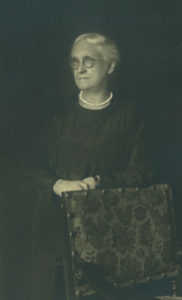
Charlotte Osgood Mason
*Charlotte Osgood Mason was born on this date in 1854. She was a white-American socialite and philanthropist.
Charlotte Louise Van der Veer Quick was born in Franklin Park, New Jersey, the daughter of Peter Quick and Phoebe Van der Veer. She was raised by her maternal grandfather, Schenck Van der Veer, whose last name she took. She married Rufus Osgood Mason on April 27, 1886. She came from a rich family, and her wealth increased after the death of her husband, Rufus Osgood Mason.
She used her wealth to support artists such as Aaron Douglas, Langston Hughes, Arthur Fauset, and Miguel Covarrubias of the Harlem Renaissance, particularly Zora Neale Hurston's project of Barracoon: The Story of the Last "Black Cargo," 1927, unpublished until 2018. Despite the supportive black interest and intervention on behalf of Mason, her role in Harlem Renaissance scholarship was also controlling, demeaning, and patronizing.
Scholars have criticized Mason and dismissed her as a delusional tyrant. They have attacked her essentialist views, glossing over the fact that other white and prominent black leaders shared her tendency toward essentialist thinking. Mason’s biography confirms that “the most detailed information on her life is in the autobiographies and biographies of the major Harlem Renaissance figures she patronized.”
Mason achieved much of the anonymity and obscurity she sought, even avoiding a published obituary in the New York Times. Tracing her portrayal through autobiographical, biographical, and other scholarly accounts reveals a loss of the nuances of complex human relationships and the evolution of an immediately recognizable caricature of a white-haired, racist tyrant perched high atop her throne.
Inseparable in Harlem Renaissance studies is her search for spiritual illumination through the art of what she saw as primitive peoples; Mason typified the evils of white patronage in the face of essentialist agendas for racial uplift that extended from Harlem Renaissance leaders like Alain Locke to modern scholarship on the age of the New Negro. Charlotte Osgood Mason died in New York City on April 15, 1946.